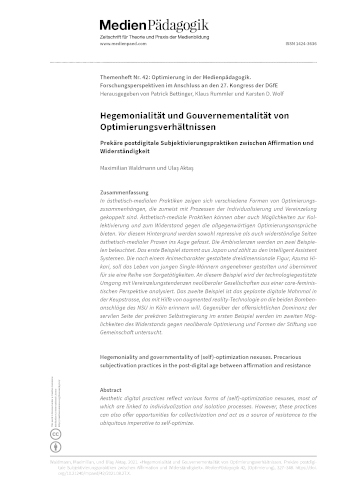Abstract
Aesthetic digital practices reveal various forms of optimisation contexts that are mostly coupled with processes of individualisation and isolation. However, aesthetic digital practices can also offer possibilities for collectivisation and resistance against the omnipresent demands for optimisation. Against this background, both repressive and resistant sides of aesthetic-medial practices will be considered. The ambivalences are illuminated by two examples. The first example comes from Japan and the field of Intelligent Assistant Systems. The three-dimensional figure, Azuma Hikari, designed after an anime character, is supposed to make the lives of young single men more pleasant and takes over a number of care activities for them. This example is used to analyse the technology-supported handling of isolationist tendencies in neoliberal societies from a care-feminist perspective. The second example is the planned digital memorial in Keupstrasse, which aims to commemorate the two bombings of the NSU in Cologne with the help of augmented reality technology. In contrast to the obvious dominance of the servile side of precarious self-government in the first example, the second examines possibilities of resistance to neoliberal optimisation and forms of community foundation.References
Allert, Heidrun, Michael Asmussen, und Christoph Richter. 2018. «Formen von Subjektivierung und Unbestimmtheit im Umgang mit datengetriebenen Lerntechnologien – eine praxistheoretische Position». Zeitschrift für Erziehungswissenschaft 21 (1): 142–58. https://doi.org/10.1007/s11618-017-0778-7.
Arendt, Hannah. 1986. «Ziviler Ungehorsam». In Zur Zeit. Hannah Arendt. Politische Essays (1943–1975), herausgegeben von Marie Luise Knott, 119-161. Berlin: Rotbuch.
Bettinger, Patrick. 2020. «Materialität und digitale Medialität in der erziehungswissenschaftlichen Medienforschung. Ein praxeologisch-diskursanalytisch perspektivierter Vermittlungsversuch». In Jahrbuch Medienpädagogik 15: Erziehungswissenschaftliche und medienpädagogische Online-Forschung: Herausforderungen und Perspektiven, herausgegeben von Johannes Fromme, Stefan Iske, Therese Leik, Steffi Rehfeld, Jasmin Bastian, Manuela Pietraß, und Klaus Rummler, 15–34. Zürich: Zeitschrift MedienPädagogik, Sektion Medienpädagogik (DGfE). https://doi.org/10.21240/mpaed/jb15/2020.03.04.X.
Butler, Judith. 2012. «Kann man ein gutes Leben im schlechten führen? Judith Butlers Dankesrede». Frankfurter Rundschau, 15. September 2012, Abschn. Kultur. https://www.fr.de/kultur/kann-gutes-leben-schlechten-fuehren-11319646.html.
Castro Varela, M. 2018. «‹Bildet euch, denn wir brauchen all eure Klugheit› Erwachsenenbildung und kontrapunktische Solidarität». In Dokumentation der Tagung „Gegen den Strich. Solidarität in der Erwachsenenbildung, 29. – 30. Mai 2018, St. Wolfgang, Österreich, 18-30, https://www.bifeb.at/fileadmin/user_upload/doc/gegen_den_strich_dokumentation.pdf.
Celikates, Robin. 2010. «Ziviler Ungehorsam und radikale Demokratie. Konstitutive vs. konstituierte Macht». In Das Politische und die Politik, herausgegeben von Thomas Bedorf and Kurt Röttgers, 274-302. Frankfurt a. M.: Suhrkamp.
Connell, Raewyn. 2015. Der gemachte Mann. Konstruktion und Krise von Männlichkeiten. Wiesbaden: Springer VS. https://doi.org/10.1007/978-3-531-19973-3.
Crawford, Kate. 2016. «Artificial Intelligence’s White Guy Problem». The New York Times, 25. Juni 2016, Abschn. Opinion. https://www.nytimes.com/2016/06/26/opinion/sunday/artificial-intelligences-white-guy-problem.html.
Dander, Valentin. 2020. «Sechs Thesen zum Verhältnis von Bildung, Digitalisierung und Digitalisierung». In Digitalisierung – Subjekt – Bildung: Kritische Betrachtungen der digitalen Transformation, herausgegeben von Valentin Dander, Patrick Bettinger, Estella Ferraro, Christian Leineweber, und Klaus Rummler, 19–37. Opladen: Verlag Barbara Budrich. https://doi.org/10.2307/j.ctvvb7n3h.
Dimitrova, Petja, Eva Egermann, Tom Holert, Jens Kastner, und Johanna Schaffner. 2012. Regime. Wie Dominanz organisiert und Ausdruck formalisiert wird. Münster: Ed. Assemblage.
Eubanks, Virginia. 2018. Automating Inequality. How High-Tech Tools Profile, Police, and Punish the Poor. Maidenhead: Melia Publishing.
Geschke, Daniel, und Matthias Quent. 2016. «Sekundäre Viktimisierung durch die Polizei?» In Rechtsextremismus und „Nationalsozialistischer Untergrund“: Interdisziplinäre Debatten, Befunde und Bilanzen, herausgegeben von Wolfgang Frindte, Daniel Geschke, Nicole Haußecker, und Franziska Schmidtke, 481–505. Edition Rechtsextremismus. Wiesbaden: Springer Fachmedien. https://doi.org/10.1007/978-3-658-09997-8_21.
Hall, Stuart. 1982. «The Rediscovery of ‘Ideology’: Return of the Repressed in Media Studies». In Culture, Society and the Media, herausgegeben von Tony Bennett, James Curran, Michael Gurevitch, und Janet Wollacott, 56–90. London: Routledge. https://doi.org/10.4324/9780203978092.
Hall, Stuart. 1994. Die Frage der kulturellen Identität. In Rassismus und kulturelle Identität. Ausgewählte Schriften 2, edited by Ulrich Mehlem, Dorothee Bohle, Joachim Gutsche, Matthias Oberg and Dominik Schrage, 180–222. Hamburg: Argument.
Hark, Sabine, und Paula-Irene Villa. 2017. Unterscheiden und herrschen: Ein Essay zu den ambivalenten Verflechtungen von Rassismus, Sexismus und Feminismus in der Gegenwart. Bielefeld: transcript Verlag. https://doi.org/10.14361/9783839436530.
Knox, Jeremy. 2019. «What Does the ‘Postdigital’ Mean for Education? Three Critical Perspectives on the Digital, with Implications for Educational Research and Practice». Postdigital Science and Education 1 (2): 357–70. https://doi.org/10.1007/s42438-019-00045-y.
Lorey, Isabell. 2012. Die Regierung der Prekären. Wien, Berlin.
Marchart, Oliver. 2008. Cultural Studies. Konstanz: UVK UTB.
Müller, Oliver. 2010. Zwischen Mensch und Maschine. Vom Glück und Unglück des Homo Faber. Berlin: Suhrkamp.
Penny, Laurie. 2016. «Why do we give robots female names? Because we don‘t want to consider their feelings». NewStatesman, 22 April 2016. https://www.newstatesman.com/politics/feminism/2016/04/why-do-we-give-robots-female-names-because-we-dont-want-consider-their.
Ranga, Marina, und Henry Etzkowitz. 2010. «Athena in the World of Techne: The Gender Dimension of Technology, Innovation and Entrepreneurship». Journal of Technology Management & Innovation 5 (1): 1–12. https://doi.org/10.4067/S0718-27242010000100001.
Ronald, Richard, und Yosuke Hirayama. 2009. «Home Alone: The Individualization of Young, Urban Japanese Singles». Environment and Planning A: Economy and Space 41 (12): 2836–54. https://doi.org/10.1068/a41119.
Sternfeld, Nora. 2020. «Eine Demokratie lernen, die es noch nicht gibt». In Making Democracy - Aushandlungen von Freiheit, Gleichheit und Solidarität im Alltag, herausgegeben von Elke Rajal, Oliver Marchart, Nora Landkammer, und Carina Maier, 205–14. Bielefeld: transcript Verlag. https://doi.org/10.14361/9783839450161-017.
Said, Edward. 1978. Orientalism. New York: Pantheon Books.
Terranova, Tiziana. 2000. «Free Labor: Producing Culture for the Digital Economy». Social Text 18 (2): 33–58. https://muse.jhu.edu/article/31873.
Vasconcelos, Elvia. 2018. «Gendering Personal Intelligent Assistants». Elvia’s Blog of Everything (blog). 2. Mai 2018. https://elviavasconcelosblog.wordpress.com/2018/05/02/gendering-personal-intelligent-assistants/.
Weber, Jutta, und Corinna Bath. 2007. «’social’ Robots & ‘Emotional’ Software Agents: Gendering Processes and De-Gendering Strategies for ‘Technologies in the Making’». In Gender Designs IT: Construction and Deconstruction of Information Society Technology, herausgegeben von Isabel Zorn, Susanne Maass, Els Rommes, Carola Schirmer, und Heidi Schelhowe, 53–63. Wiesbaden: VS Verlag für Sozialwissenschaften. https://doi.org/10.1007/978-3-531-90295-1_3.

